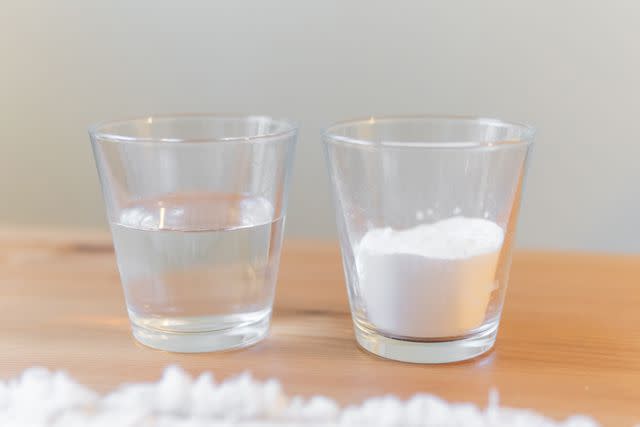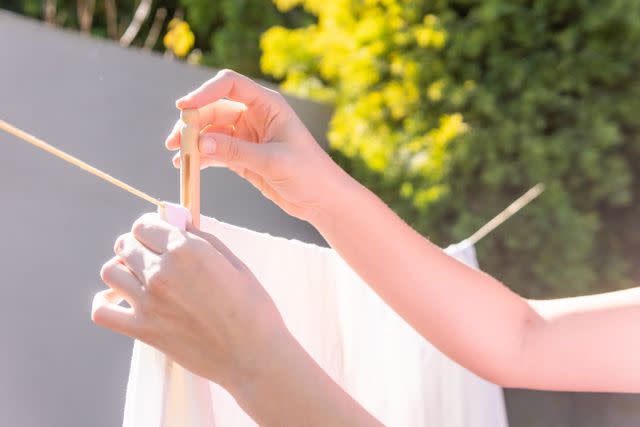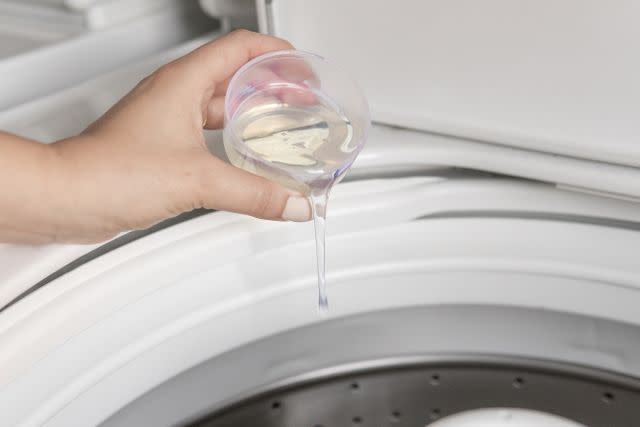How to Soften Your Sheets
Here's how to treat yourself to soft, silky sheets

The Spruce / Nanor Zinzalian
Fact checked by Jessica Wrubel
How do you make sheets softer, especially those new ones right out of the package? There are a few easy things you can do that will soften your sheets so you can get a good night's sleep. A number of these are natural options that are probably already waiting for you in your pantry.
So get ready to enjoy the luxurious feel of sliding into bed on a set of soft, freshly washed sheets straight from the dryer with these solutions.
Baking Soda/Vinegar Trick
There are two simple ingredients that can turn even basic, inexpensive sheets into silky soft bedding: baking soda and vinegar. All you have to do is toss those stiff sheets into the washer with 1 cup of baking soda and 1/2 cup of vinegar, and wash for one cycle. Be sure to completely omit your regular detergent this time around, as it tends to lock chemicals into the sheets.
For better results, you can try starting your washer on hot water and then switch to cold as it enters the rinse cycle. You may also want to hold off on the vinegar and add it during the rinse cycle to prevent the formation of carbon dioxide from bubbling over (think about those volcano experiments you did in elementary school).
If you're washing a larger set of sheets (queen or larger), you may want to wash the bottom sheet as well as any top sheets separately to ensure there's ample room in your washing machine. If they are squashed in, not only can this cause problems for your machine, but the softening process may not be so effective.

The Spruce / Nanor Zinzalian

The Spruce / Nanor Zinzalian
Give Your Sheets a Bath
With Epsom salts, that is. You can be on your way to silky sheets without ever having to touch your washing machine thanks to the power of Epsom salts. Simply fill a tub with cold water and about 50 grams of Epsom salts, and stir for a few minutes (try using a wooden spoon to protect your hands from the cold). You'll want to allow your sheets to soak overnight, and then the next morning, rinse your sheets thoroughly and hang them outside to dry.
Other ingredients that you can bathe your sheets in are borax and salt. Try filling your laundry tub with cold water and either 6 tablespoons of borax or two handfuls of salt, stir, and allow to soak overnight before rinsing and hang drying the next morning.
Try Turpentine
You may not have thought that turpentine has any place in your laundry room, but this solvent can be a sure-fire way to help soften those sheets. If you add about 1/2 cup of turpentine and then wash your sheets on a regular cycle, your sheets will come out from the machine softer than you ever thought possible.
However, please note that it is important to skip the dryer and line dry when using turpentine on your sheets. Turpentine is combustible and if there's any trace remaining on your sheets before you toss them in the dryer, you could start a fire. Plus, this is another option that isn't particularly environmentally friendly.

The Spruce / Nanor Zinzalian
Use Fabric Softener
It may be a much more obvious tip than turpentine or borax, but products like fabric softener were made to get your bedding as silky soft as possible. Simply add the recommended amount of fabric softener to your machine along with your regular detergent when washing, or you can even just use the softener by itself and run your sheets through a wash/dry cycle.
Wash Multiple Times
Here's another suggestion that may not be especially popular, but consider washing your sheets not just once, but twice in a row. After you've completed a full wash and dry cycle, stick those sheets right back into the washer and do it all over again.
Yes, it sounds like a lot of work and it may not be so environmentally-friendly, but that double wash can do wonders when it comes to the softness of your sheets. Generally speaking, good quality sheets will continue to become softer after every wash, dry, and iron cycle. They can then be either dried via machine or outdoors.

